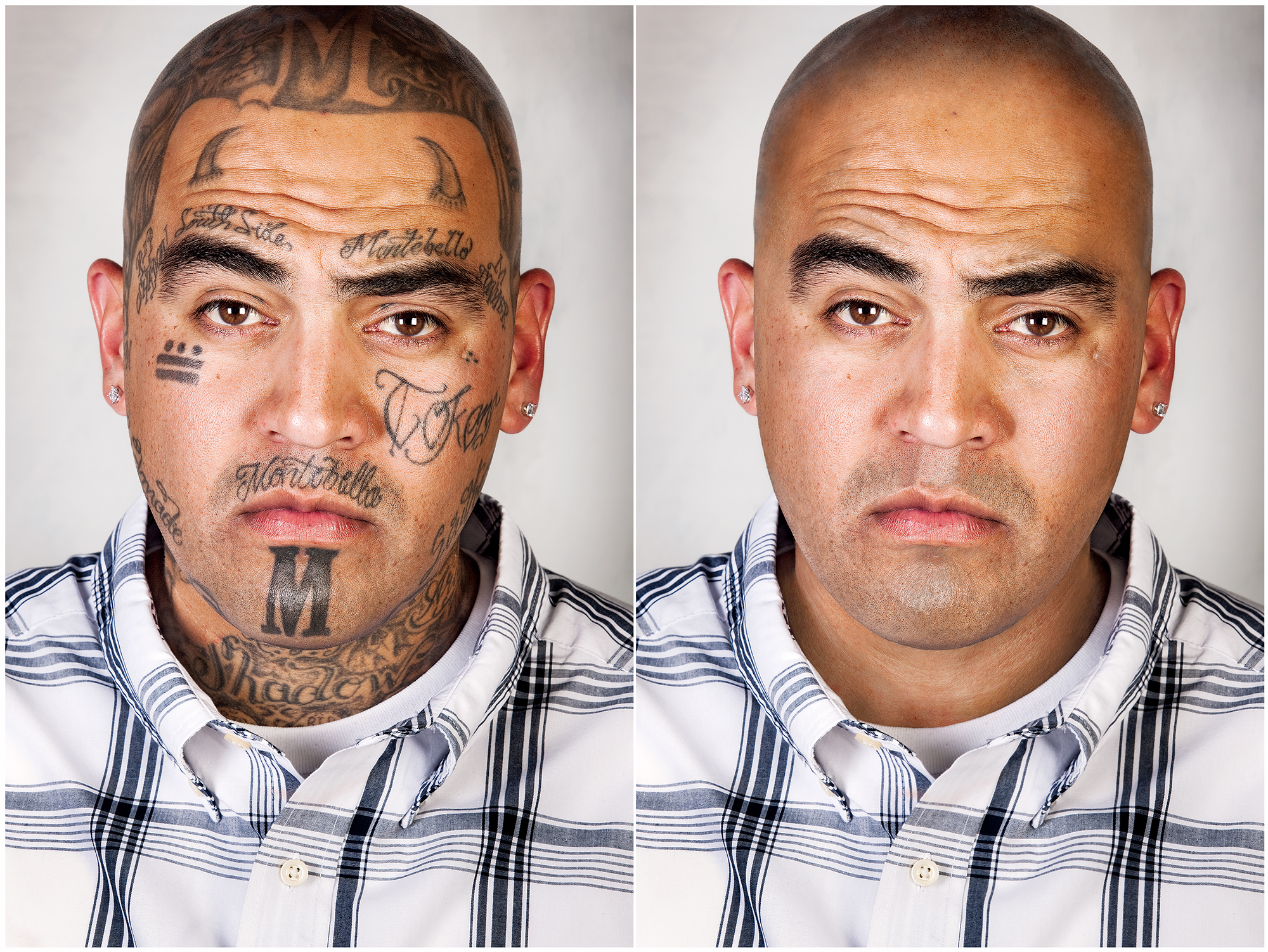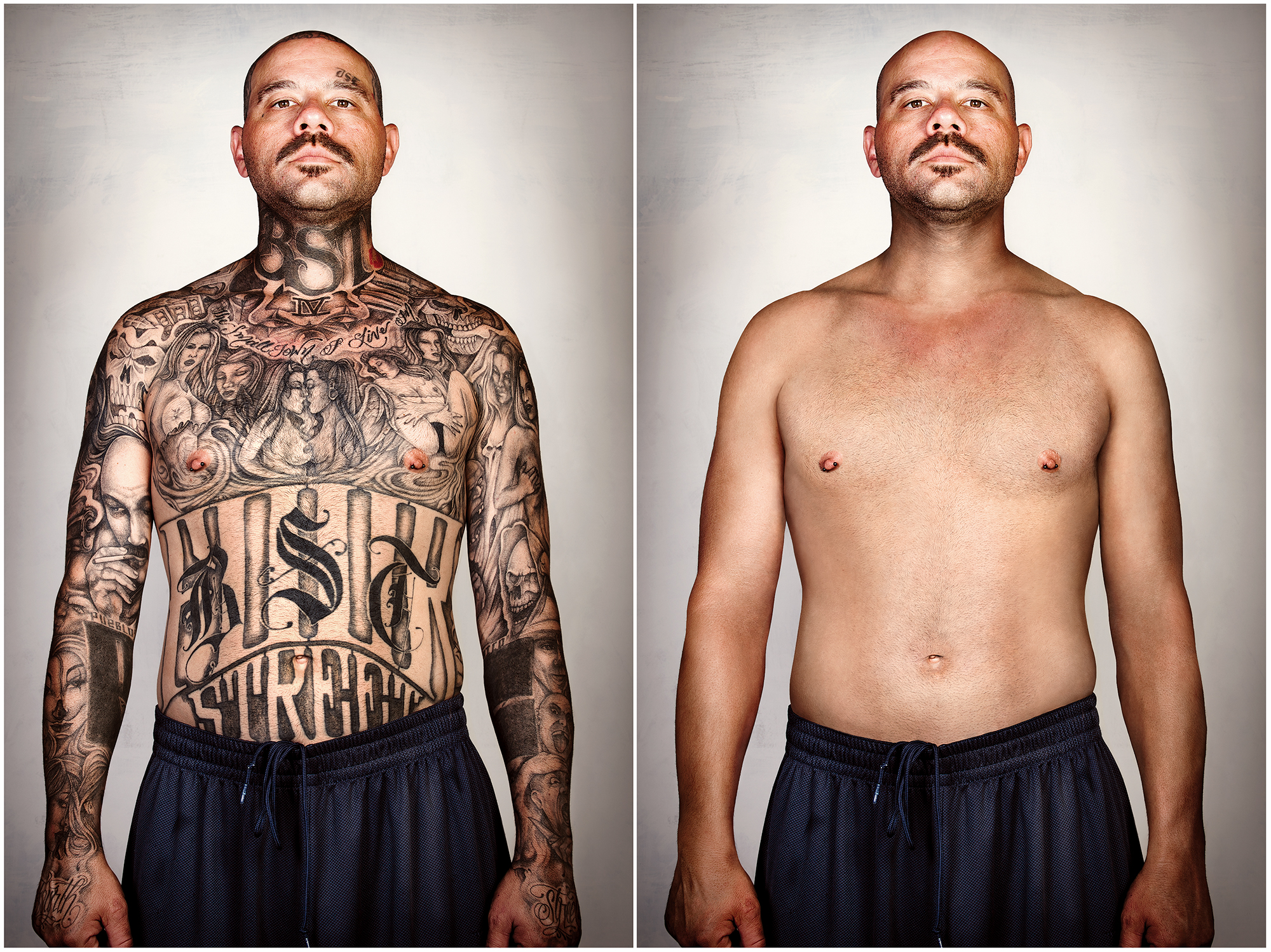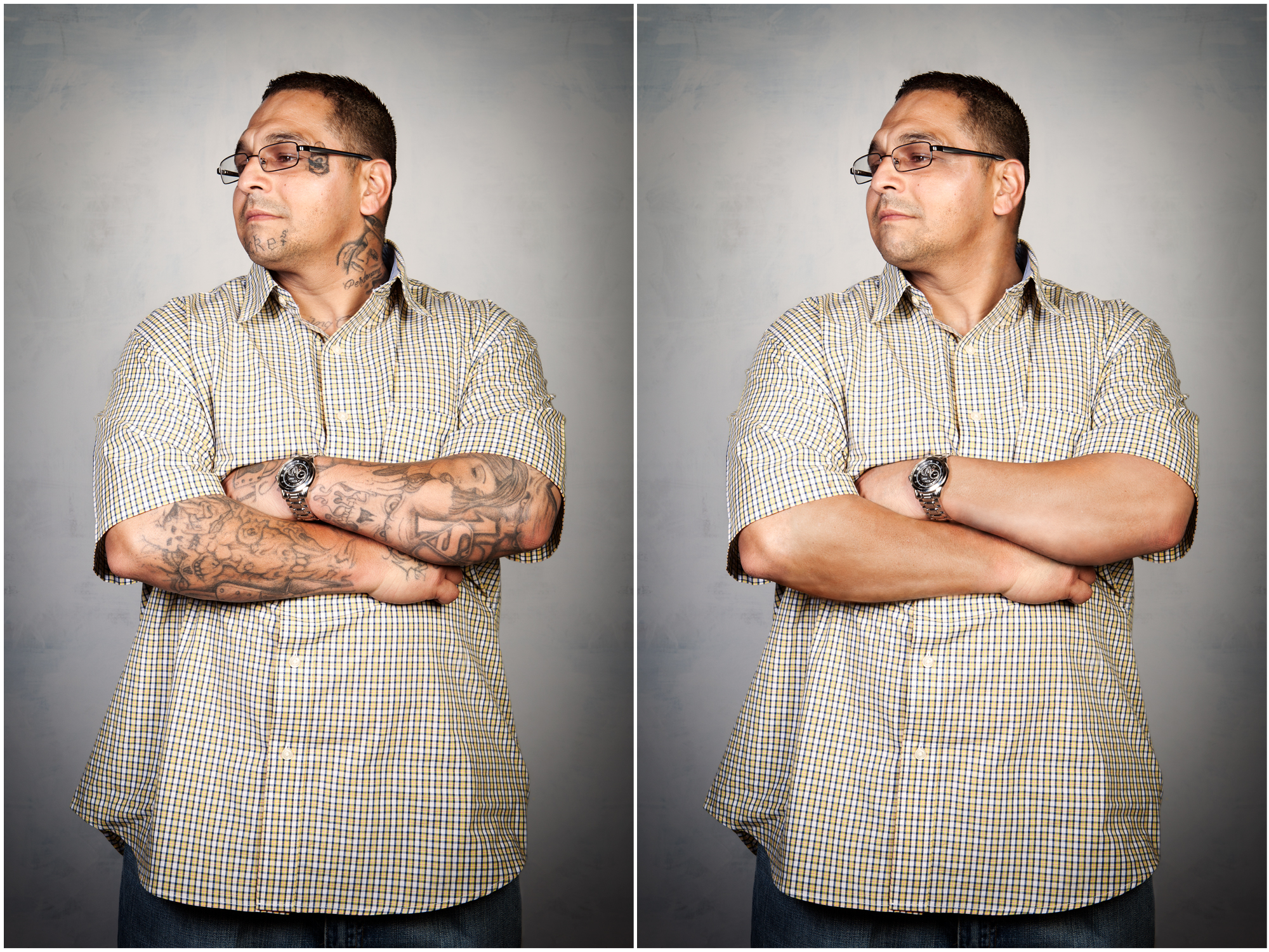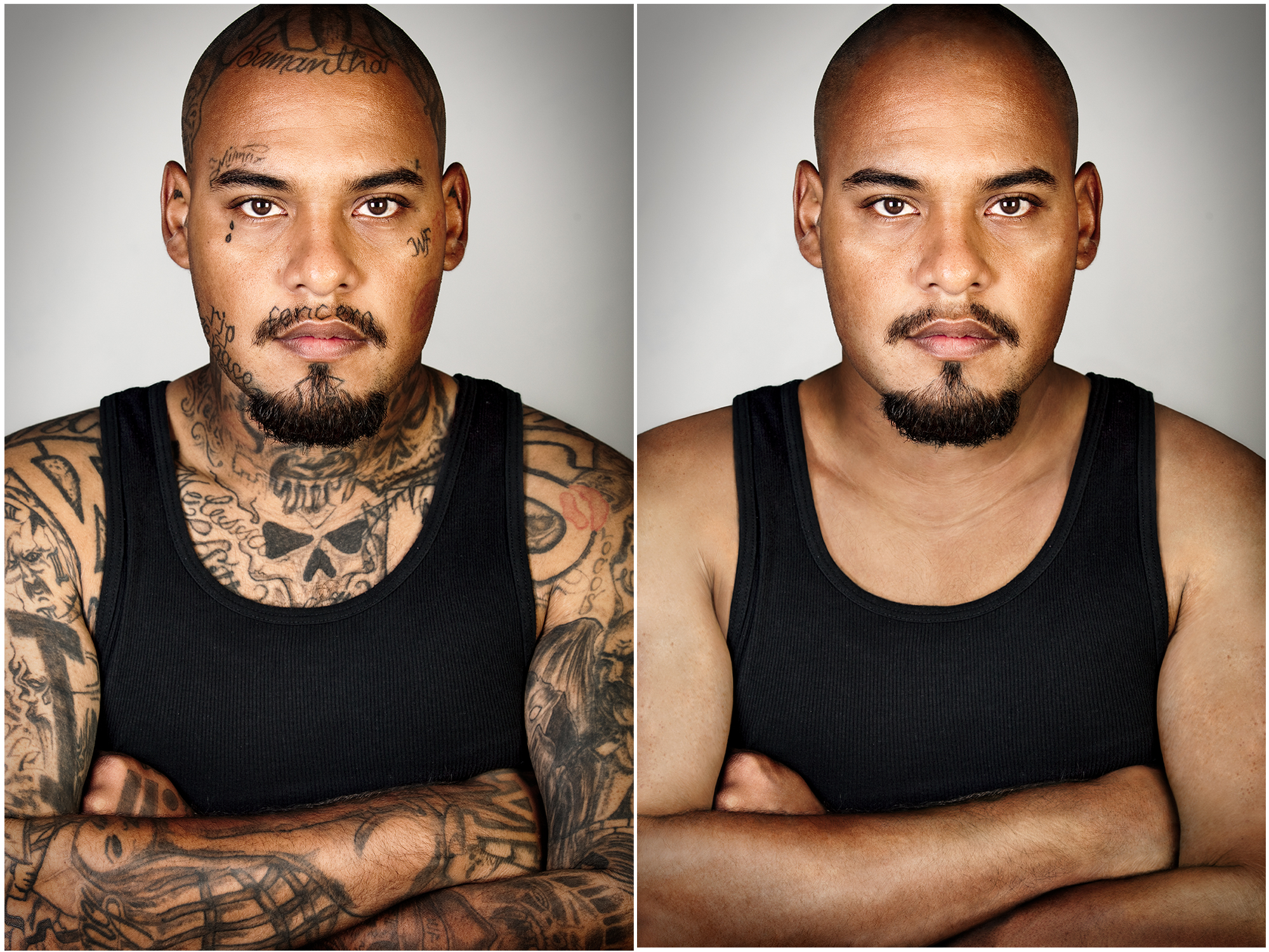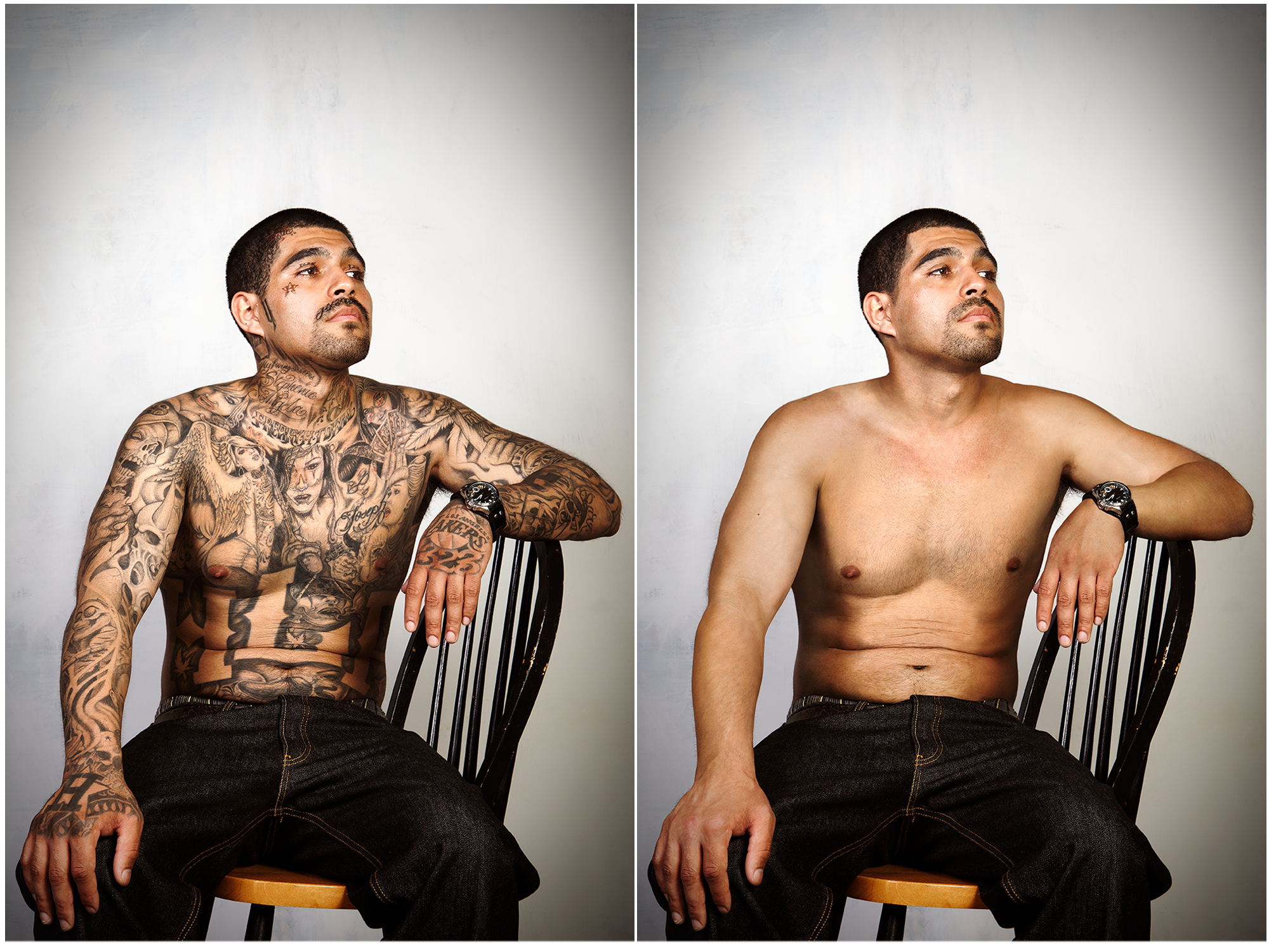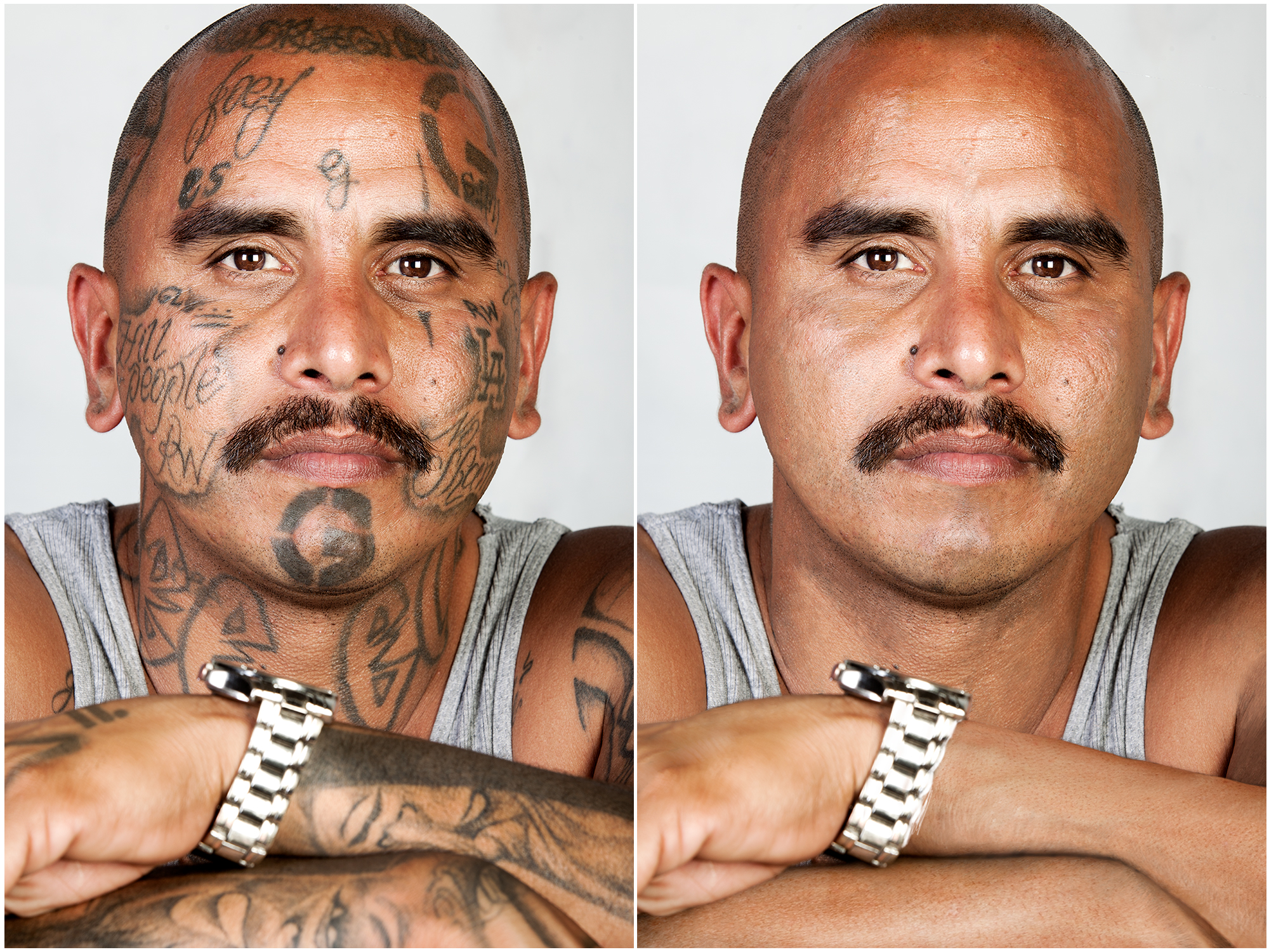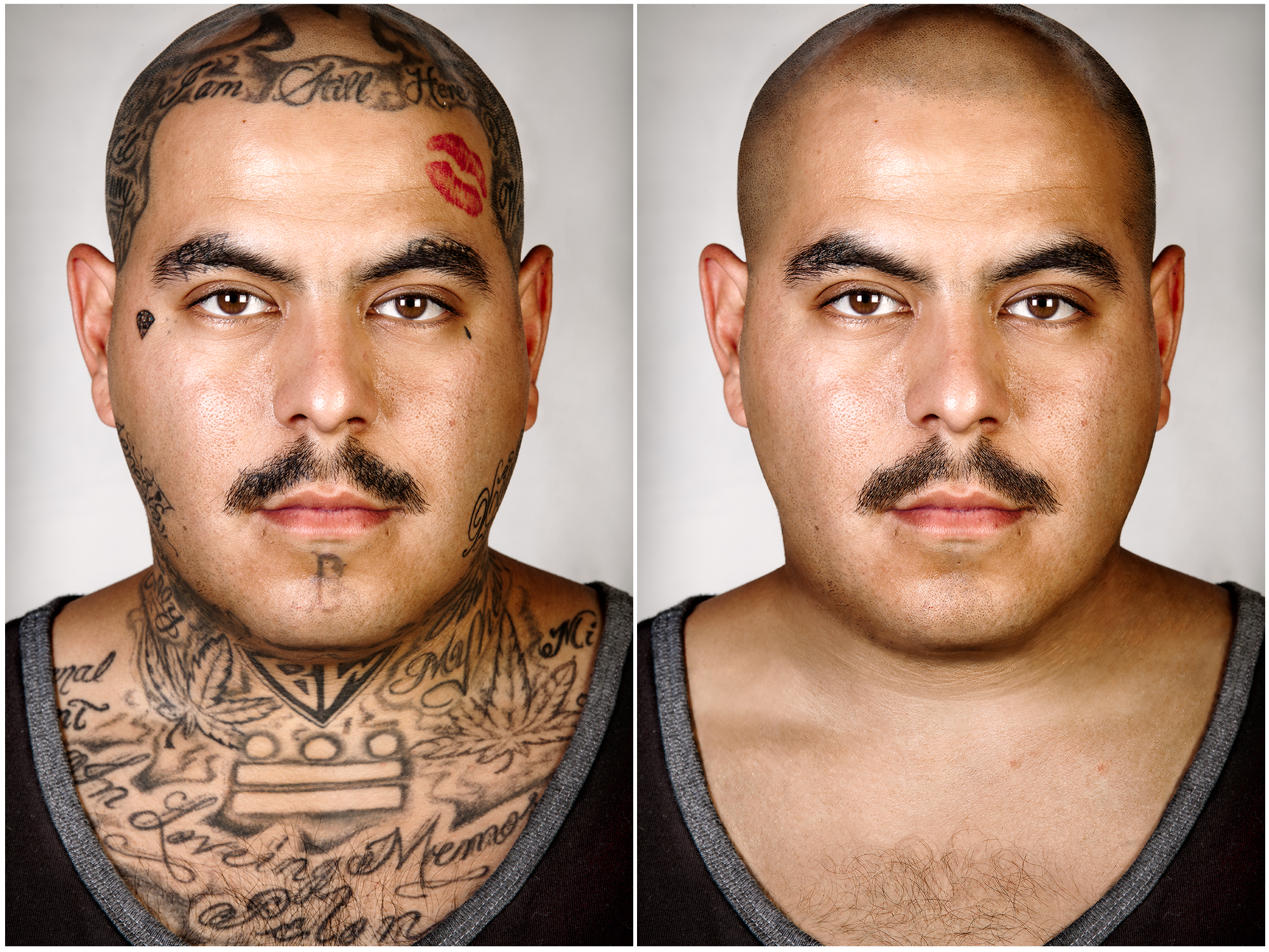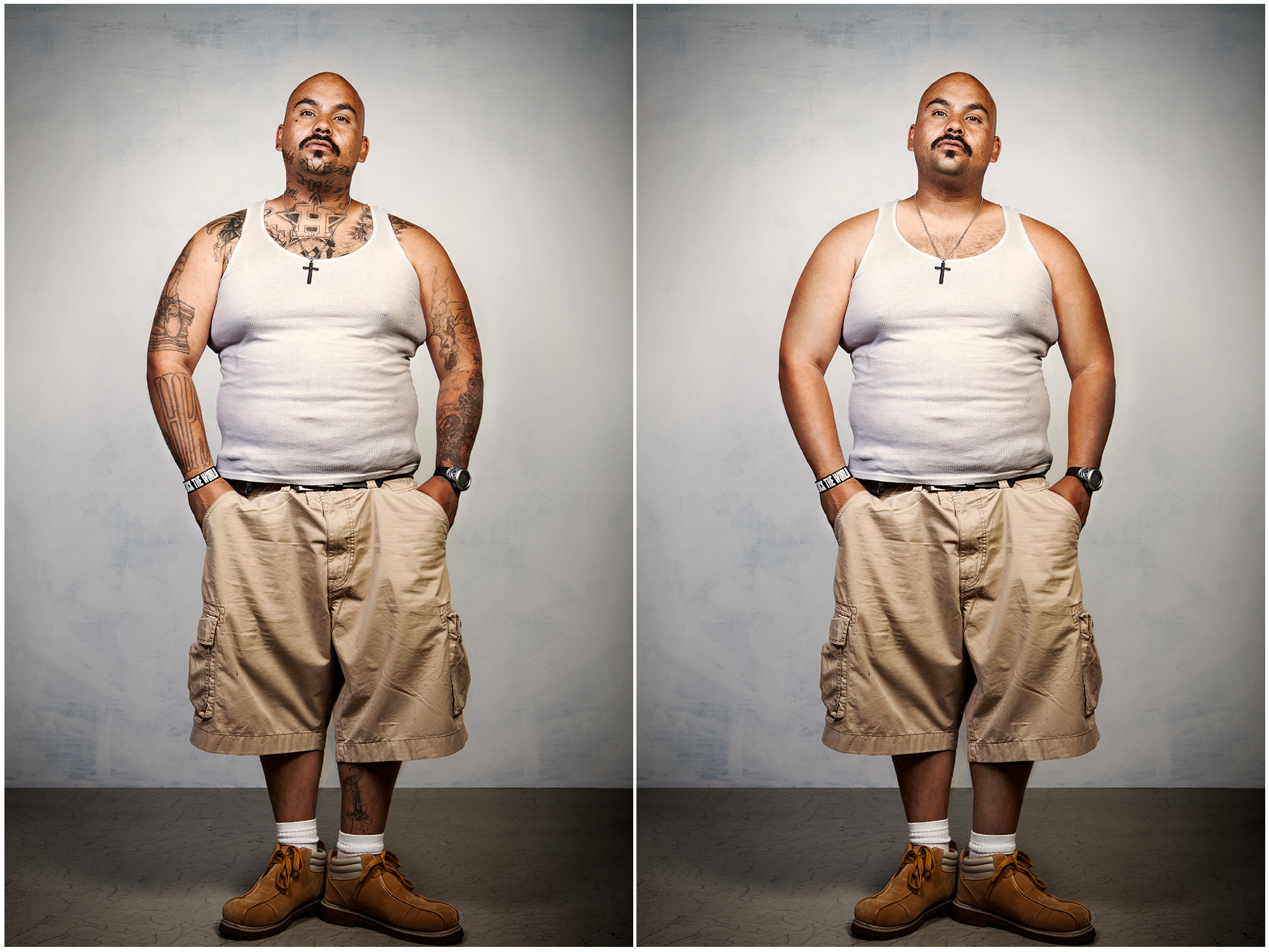Skin Deep, Looking beyond the tattoos is a portrait series that seeks to understand the impacts tattoos have on former gang members and people trying to escape the gang life. How we as a society judge ex-gang members with tattoos and ultimately how they judge themselves.
Portraits are taken of the participants. Their tattoos are then digitally removed creating before and after images. The subjects are then interviewed on video while being presented the portraits.
I hope this project helps put a very human face on a group of people that are so often demonized by society. By giving them a forum to talk about themselves, families, aspirations for the future and what tattoos mean to them, while the public is educated about the obstacles these individuals must overcome to re-enter society. To purchase the book please go to Skin Deep, Looking beyond the tattoos on Amazon, published by Powerhouse books.
MARCUS LUNA
MARCOS LUNA (part of the interview from the book Skin Deep, Looking beyond the tattoos)
Oh, hell no!
Damn, I look like my son, eh? Are you fucking serious dude? Fuck, I do have love handles! Ha ha!
Fuck...
That’s how I look. How many years is that?
It’s a long me. It’s in my 20s (since he’s seen himself without ta oos).
There are no words for it. That’s crazy.
It’s emotional. Fuck, I fucked up big! I’m not saying that...I love my hood, but damn.
I am a man, eh?
Fuck, this is me man (looking at the picture without tattoos).
I don’t know...
I guess I’ve become like this, you know? I could imagine if I didn’t I would look like this.
Totally different story! That’s a lot of years, that’s a lot of work dude. That took a lot of work.
The tattoos mean a life with the gentlemen, my homies you know?
Brings a lot of death, sadness, hate, and destruction...sick. Just out of control, eh?
But not a savage, this is a person that has been through a lot, he has been through his own masterpiece.
I call it a book you know (looking to the photograph with the tattoos). This is my book right here. This is my book.
DENNIS ZAMORAN
DENNIS ZAMORAN (part of the interview from the book Skin Deep, Looking beyond the tattoos)
I don’t know where I went wrong? Everyone in my family is average. It’s like you know how they say, the only rotten apple. I’m like the only rotten apple. My dad was not involved in gangs but he was with the cartels, the Mexican cartels. So he sold drugs, he did coke. But when he was around he was like the best dad. He would buy us whatever we wanted, would never hit us. But he was always in jail, always in jail. I went on the run with him. I was on the run when I was 16 for attempted murder and I was like, I have to leave. I left the United States and went to Mexico.
When I was in Mexico we had to struggle to survive. I started selling drugs with him. Then I went back to California and it all started out with graffiti, being taggers. I was from this little crew just doing graffiti on the walls, then I started carrying guns. I started thinking to myself, “Why am I from a tagging crew when I could just be from a gang. I’m already carrying guns.” That is how I started.
FRANCISCO FLORES
FRANCISCO FLORES (part of the interview from the book Skin Deep, Looking beyond the tattoos)
When I was little my dad was a crackhead. He did not have money for the dope so my mother would pay for it with her body; my dad would prostitute my mom to get his drugs. My dad was not the coolest guy to be around. He used to kick us out in the middle of the night; we would sleep outside. I was six at the time, my little brother was four, and my eldest brother was seven.Although my other brother is older, I was always the one to take everything for them, you know. They are good people
you know. I was always looked at like the bad sheep of the family, always got the, “You’re nothing, you’re a piece of crap.”
So I took that and I ran with it. At the age of six, one night my dad and my mom kicked us out of the house because the dope man was in there. A gentleman that used to be my neighbor, his name was Carlos, he is the one that basically accepted me into his family.
He came out and said he was tired of this shit. He was sixteen and he took it upon himself to become my mentor and my dad for that time. I took a loving to this guy. He was there for me regardless. It could be the middle of the night and he would let me sleep in his house...I felt like I was his son. He taught me a lot of good stuff; he taught me how to keep in school stay away from drugs, stay away from gangs.
One day in summer he was walking me back from school, at that time I lived in East LA. A gentleman walks up to us and asks him, “Where are you from?” He does not pay any attention to him, five minutes later he asks him again, “Where are you from?” Now he was angry. All that all I remember was hearing multiple pops. I heard pops pop pop pop pop pop pop, seven shots. As soon as I turned around I felt something splash in my face, it was his brain matter. He got shot in his face. His blood, his brains covered my body. He fell to the ground and he was screaming, he was crying. I grabbed him, he kept on telling me not to let him die, I held him in my arms until he died, but everyone else said that he was already dead when I picked him up that it was me that was screaming, that it was me saying not to let him die. After that everything went downhill.
DAVID PINA
DAVID PINA (Part of the interview from Skin Deep, Looking beyond the tattoos)
Man, it’s a big difference! I look like my brother, damn.
That’s crazy. That looks really crazy. Those came out cool man! I think my mom would have liked to have seen that. She passed away in 2007 when I was in prison. This looks weird. I am not used to seeing myself like that. It’s kind of funny.It’s like two different people. I’m like my dad in the pictures without all that stuff on my body and my face. You can kind of tell my dad’s features. In this one, I look younger, but in this one, I look older. I look like my brother. I think I am just used to seeing this (looking at the tattooed picture) and this one shocks me! It’s good. You did a good job, eh? You did a good job. I joined the gangs when I was a kid. I got in at 11 years old and then like two months later I got into my neighborhood (gang) I went to juvenile hall. I was only supposed to do six months, but the things that I did in there...pretty much, well, you can say I committed another crime in there. It made my stay go from six months to about seven years. They kept me there till I was 18 years old.
I did all those years straight, and then I got out at 18 and lasted out here for four years. I got busted and went back to prison for nine years and now I am out. I have been out for nine and a half months now. I pretty much did most of my me in there, more than I have spent out here. So I am used to being in there. I don’t want to be in there, but I know how it is. So it kind of comes naturally to me. As a kid, I looked up to my homeboys, my neighborhood, and my mom. Everyone is from my neighborhood (gang). My brother, god rest in peace. Pretty much everyone is from my neighborhood.
DAVID WILLIAMS
DAVID WILLIAMS (Part of the interview from Skin Deep, Looking beyond the tattoos)
I have a son now, a five-year-old boy. I don’t want the cycle to keep going like that. It needs to stop. It did not stop with me, but I want it to stop with my son. My son brings me joy. I love to see my boy my 5-year-old son. I love him to death. I would do anything for him. I just don’t want him to do nothing.
He is already tripping on my tattoos and stuff why I have horns and stuff. I want to tell him like; I don’t know what to tell him. Tell my son don’t pay any attention to it. Just I don’t know what to tell a 5 year old you know. Like I know he really doesn’t know, but he is going to know when he gets older man.
Damn, I just hope he… Sometimes… I just think, don’t be around him and he won’t be like me you know. He won’t be nothing like me because he won’t see me like I am. But then again a kid wants their dad in their life. He is going to want me; he is going to want to know who I am and stuff so it’s just like, it’s kind of hard. But my son he brings me joy.
MATTHEW PEREZ
MATTHEW PEREZ (Part of the interview from Skin Deep, Looking beyond the tattoos)
I wanted to break down. I remember it was like it was everything. That was basically it, right there. I was like damn, now I have nothing! I got no home, got no car, got no women, nothing!
I came to Father Greg. I came to see if he would help me out. To get my car out and usually he would, you know. Usually, Father Greg helps, but he said to me this time, he said, “We don’t have the funds, I can give you a car and I can give you a job but that is not going to change what is going on with you. It’s not going to change the issues you are going through. The addiction you are going through, that isn’t going to change it. You have to surrender, you have to retreat. You have to get your mind right again, you have to get clean. Deal with you problems and get them out of the way, fix yourself, repair yourself.”
And he was right, you know. Hearing that from him, I could see like, hearing it from him, I would probably would have not listened to a thousand people but hearing Father Greg telling me you know, “Hey let it go, let the car go.” And I was like you know man, you are right; just let it go, let it go. And I was like, all right. I am going to let it go. I am going to go to rehab. He said, “After those 90 days I promise you, I give you my word, everything is going to fall back in to place.”
And I believe him.
VINCENT RAMOS
VINCENT RAMOS (Part of the interview from Skin Deep, Looking beyond the tattoos)
My name is Vincent Ramos. I am from Long Beach, 4th Street.
Interviewer shows the pictures.
I feel naked, put my clothes back on!
I have been getting tattoos for a little while, from when I was young, since I was 13 when I started with the gangs.
My parents were around; they were not in the gangs. Gangs
just came naturally (to me).
I am trying to enjoy life and catch up on a lot of things that I missed out on. And that’s it, you know? I am a pretty simple man. Just catching up on having fun, whatever you do in life.
What do you think people will see when they look at these pictures? What do you want them to see?
I don’t know what they will think. Everyone will have their own opinion. It does not ma er what they see, they are going to see what they want to see. It is on them
GABRIEL LOPEZ
GABRIEL LOPEZ (Part of the interview from Skin Deep, Looking beyond the tattoos)
It would be our life. So I get in when I was 14. It was just how it was, no one was going to stop us. That’s what they showed us, so naturally, we followed and it just went from there. Then I saw a couple of cousins die, and one cousin was crippled, so I felt obligated, that I had to participate now because my cousins are dying. I felt that I had to give retaliation, I felt obligated to my family and to myself as a man. Although I was a kid I had to be a part of it too. There was real gang warfare going on, people were dying all the time. They would cross over, kill one of us, we would go over kill one of them, back and forth nonstop just killing each other. I was shot five times I was in a car and one of us got shot right in front of me. I did not get hit but he was hit three times and killed. I was lying on the floor. They used an AK-47 and I did not get hit. There were a lot of things. Now that I look back I am scared for that kid that did not know what he was doing, but at the time I was all for it, I was down, I thought that was cool and that was just part of life. I wouldn’t do it again, I don’t know how I survived it.
I feel scared for that kid back then, but that kid became a man and 18 months ago I decided to change my life. The hardest thing has been coming to terms with the person who I was. I was a monster. Being comfortable in my own skin, to talk about it, to talk about my life story, the person I used to be. I don’t glorify what I did being a gang member. I don’t glorify what I had to do to survive in prison. I chose my gang and the street life over my kids and that is the person I used to be, but now that I have changed my life I have my kids back in my life, I talk about the way I used to be so people can see that if I can change then anyone can change.
CALVIN HASTINGS
CALVIN HASTINGS (Part of the interview from Skin Deep, Looking beyond the tattoos)
Stereotyping is always going to be there like with the tattoos. It’s different now, everyone has them. Before no one had them, everyone looked at you and were like, wow! But now the average person has them. Famous people have them now. I mean, it’s a good thing, but the stereotype is always going to be there. It’s just I don’t know how to say it. It’s like I just don’t want anyone to stereotype. Like anybody listening to this interview will be thinking, “he seems like a nice person.” You know what I mean?
I don’t want you rolling up your window when you see me coming down the street.
It’s like come on man! It’s like I don’t need what you got. You don’t need to do all that. You know what I mean? I’m just passing right by you. I actually don’t even see you like that.
CHRISTIAN RIVERA
CHRISTIAN RIVERA (Part of the interview from Skin Deep, Looking beyond the tattoos)
Oh shit! It has been a long time since I have seen myself like that. I’m shocked. I’m already working on them [getting my tattoos removed].
My tattoos represent my neighborhood, most of them. I am removing the ones on my face, anything that is gang related. A few months before my brother was getting out on parole I decided to do good. I just decided to do the right thing, because I knew he was coming home after seven years. So I figured I could not tell him to stay out of trouble if I was still doing the same bullshit myself, so we decided to do it together.
He has always looked up to me; I feel I am to fault with a lot of things that have happened in our lives because I was the first one to gangbang out of all of us. After I started gangbanging my twin brother liked that and he started gangbanging, then my little cousin started gangbanging and my baby cousin. My little brother wanted to get into the neighborhood and I told him he could not get in. I made sure that all my homies knew if they jumped him in, we were going to have problems, I would drop somebody. They respected that. My brother did not respect that, so he ended up joining another gang. Two months after he joined this other gang he picked up his case and was fighting life [in jail] for about two years before he took a deal. My little cousin is in state prison doing eight years.
KRIS GULLEN
PHILLIP MENDOZA (Part of the interview from Skin Deep, Looking beyond the tattoos)
Ever since I started hanging with the gangs most of my family members look down on me. They have grudges that they hold against me and talk all their crap, so I separate myself from them. All I had as my family is my neighborhood, that’s all I got. How could I just let them all go like nothing and just give up? All the effort I have put into it, and all that I have done for the neighborhood, and it’s just like, “That’s it. Move on.” Pretty easy it sounds like, but sometimes it is hard. Like I feel like I am not ready. Sometimes I feel confused and I think about it, like do I really want to end up dead over a street that is never going to be mine? I’m trying to separate myself from certain individuals, keep my distance from certain areas. Like I was in Highland Park, I try not to go there, stay separated. But, like I said, that’s another thing that is addictive: my neighborhood. I crave it, I want to go hang out, kick it, drink with the fellas.
I was sentenced to 15 years for an assault with a deadly weapon. That was in 2010/11. So I thought I was going to get caught up and catch more time. I thought like, “Fuck, I have two strikes. One more strike, that’s it. I am not going to make it. I’m not going to come back home.” Fifteen years, anything can happen, a riot can happen, anything.
So, that’s how I looked at it. I just gave up on everything. Blocked everything from outside and just thought about myself in jail, trying to survive in there.
[When I got completely tattooed] it hurt a lot of people, like my mom number one, my grandmother number two, my other grandmother that passed away earlier this year—I hurt them most of all.
KRIS GULLEN
KRIS GULLEN (Part of the interview from Skin Deep, Looking beyond the tattoos)
I thought I knew it all. After my kids were born, that is when things really got serious. I got shot five times, point blank, after my two kids were born. I continued to still do the stuff I was doing and ended up in prison and all that, and then I got out and I got shot again, and I knew I had to stop this, but it was how, you know?
I saw my kids were getting older, and they were having difficulties in their lives. My oldest is 16 and I started seeing what he was going through. My son is a really good kid, not into gangs or anything, but he was having a really hard time. And when I helped him out of that, I saw the chance to be a father. I sent him up here to this location and I decided I was not going to use heroin no more, and I just got it together. Well, it’s not together yet, but it is getting better every day.
MARIO LUNDES
MARIO LUNDES (Part of the interview from Skin Deep, Looking beyond the tattoos)
Wow! That’s amazing.
When I got all this, I was younger. I have so much work on my body and my legs. I do want to do tattoo removal, but I don’t know if I am going to be able. I have a lot of work, a lot of work, you know? I could find a better job. It is really hard for me out there. I don’t see that in here (Homeboy Industries). They respect me, they know who I am, and a lot of people out there they don’t know me so…a lot of people will be staring at me. I am a good person; I have a good heart. I have met so many people here. I have traveled to Washington with Father Greg Boyle. I have met some amazing people who know me and they know I have a good heart. But a lot of people who don’t know me, they probably think, “He is smoking drugs, he has a gun,” or that I am violent, but I am not like that no more. I left that all behind, I was growing up. My dad, he was in jail, and he did a lot of time. He left me and my older brother and my sister. So it was a real struggle for me growing up. My mom, she did not have no money. Growing up, I just saw a lot of drugs, alcohol.
SAMUEL GONZALEZ
JOSHUA L MARTIN (Part of the interview from Skin Deep, Looking beyond the tattoos)
My dad did not want me to be a gang member. He tried his best to keep me good. He tried his best. But I was not having it.
My dad started gangbanging at a young age. Back in his time, fighting is all it was. You rarely stabbed someone, you rarely shot someone. If you used a weapon, you were a punk. He got in so much trouble growing up that my grandfather sent him to the Marine Corps. My father was also a tattoo artist. But he refused to tattoo on the face. Not just me, other people too. Only from your t-shirt collar line down. He wouldn’t touch past your wrist or the back of your hand.
He used to be all muscle when I was a kid. To the point where to walk through a doorway, he had to turn to the side. He had to stop working out because he was not able to wipe his own ass! They finally ran him over, his enemies. But he’s alive. He got put in a wheelchair. He has one tattoo on his ring finger, symbolizing he is married to the neighborhood.
I started kind of late with the tattoos. All my dad’s kids had an agreement with him. Once we turn 18, he would draw us our first tattoo. So I waited.
SAMUEL GONZALEZ
SAMUEL GONZALEZ (Part of the interview from Skin Deep, Looking beyond the tattoos)
Oh man! That’s a big difference. That’s weird. [Laughs] I am so used to this [points at the tattooed picture] I cannot ever imagine myself like this [points to the retouched picture]. It’s crazy!
I like that. So that is how I would look! I got my first tattoo when I was in high school. A lot of the tattoos are prison work. There are actually a lot of good tattoo artists in there.
I am just lost for words. It’s crazy, a big difference, big difference. I just cannot picture myself like that. All my friends that I hang around with, they are all covered with tattoos, it’s just like… Damn it’s crazy. So that is exactly how I would look without them?
It took years, pretty painful too. I think my grandmother will probably trip out. I am going to show her. I am going to give her these. When my grandmother first saw me with my tattoos, she started crying. That’s why I would like to show her these, although she does not really know about the gangs. My first tattoos were the three dots on my face, this “LA,” and just some writing I have here that I have been covering up. After that, it just kept escalating. I got addicted, just kept going. I got the gang tattooed on me numerous times. It’s like apride thing I guess, just pride where you are from. Pretty much advertising it everywhere you go, that is all that is.
FRANCISCO RIVERA
FRANSISCO RIVERA (Part of the interview from Skin Deep, Looking beyond the tattoos)
Damn, I look better without tattoos! [Laughs.]
Damn, that’s a trip, can I get a copy of these? [Laughs.] It’s crazy, all the details. I got the tattoos over a long period of time. The one on my face took about two hours, but I went over it like three times. There are some that I would have not done looking back. I would have probably not done my head and my face, the visible ones. I got them all in prison. I have just got out of prison.
I was 14 when I got my first tattoo. I had an “LA” here, but I covered it up. My brother and cousin have the same one. It meant a lot to me to have the same tattoos as them. I wanted to fit in because I looked up to them both, especially my brother.
Everything my older brother did I wanted to do: the first time I got high was with him, first time I picked up a gun was with him, anything. Everything I looked up to was him. He always had the females, always doing this and that, so I wanted to do everything that he was doing. I was following in his footsteps, but I joined a different gang because when he had gotten old- er and did not want me to join a gang, he was kind of pushing me away. I chose a different crowd and I joined that gang. I’m taking the tattoos off now though, mostly because of the attention, the profiling, all that. I’m taking them off.
HONG FHAN
HONG FHAN (Part of the interview from Skin Deep, Looking beyond the tattoos)
At first, my parents did not say anything, but then it was too late. It was too late because the money was coming in. She [my mother] knew where I got it from, selling drugs. But we needed the money, so we did not care where it was coming from. I was supporting my family. They are from Vietnam.
When I was getting older, when I was like 25, it was getting out of control. Using drugs, shootings, gangs and all that. I was getting deeper and deeper, but the feeling was the rush, the feeling, it was my high. I wanted that. I felt good when I go gangbang, sell drugs, and make money. I would get high, that was my rush. My goal was to be a straight gangsta, to be a rider.
I thought my homeboys were going to be there for me, but they were not. I learned the hard way.
The only thing that I regret is that I lost respect from my family because of using drugs. That is where I lost a lot of respect and I regret that.
Now I have got myself sober, up to 4 years already, and I feel happy. I feel good about myself. It is a good feeling. I get up in the morning not stressed out and thank God for another day.
Just looking at my mom getting stressed out, getting sick because of me. To give her the happiness that she deserves because she had been through a lot. She deserved a break, and happiness, less stress.
DAVID ANDRADE
DAVID ANDRADE (Part of the interview from Skin Deep, Looking beyond the tattoos)
I was walking with my Homeboy shirt over here [near the Homeboy Industries cafe]. I was walking to catch the bus and the cops were across the street. They just came and got me, asked me, “Where are you from, what are you doing here?” I’m not about that. I explained the whole situation to them. All I do is work and hang out with my family. I don’t gang- bang, I stay out of trouble. I got out of prison and I am just about my family. That’s all I am, that’s all I want to do. Just hang out with my family and stay out of trouble.
They are still skeptical, like, “He is just saying that so we let him go.” Even though they could not arrest me they still kept me there for half an hour.
And every time I get pulled over by the police I have to notify my parole officer. Last time I got pulled over one cop asked me why I had been arrested. And I told him. He said, “You are still alive?” because it involved another police officer. So he was like, “He did not kill you?” His exact words were, “Someone was not doing their job right.” I was like, “Man, whatever…” You know?
I understand, too. They see a gang member, they probably think he has a gun. They pull them over their life is at risk too.
TAPIA JUNIOR
TAPIA JUNIOR (Part of the interview from Skin Deep, Looking beyond the tattoos)
When I was young I wanted to be a police officer. That is all I thought about, that is all I dreamed about. When I lost my mother from cancer, from there I just followed my older brother. Wherever he went I went, whatever he did I did, whatever he got I got. We grew up rough you know? My mom was into drugs, my brother he got to stay with my grandparents when my mom was still alive but I could not stay with them. I was scared. Every time she would walk home drunk she would hit us, beat us. The only time that we could spend time with my grandparents was the weekends. We used to run away. I have been in foster care, but I was not just going to leave my mom because she got sick. We knew that she had cancer so...
JUAN GARCIA
JUAN GARCIA (Part of the interview from Skin Deep, Looking beyond the tattoos)
But I came out and I went to Homeboy Industries and Father Greg. He has been a big role in my life. I love him. That’s Pops. I met him in my first camp, Afflerbaugh, I’ll never forget it.
It’s a juvenile camp. I went to his services. He tries to pretty much get to the youth before it is too late, and he caught my attention at the service. The way he talked and the way he told his stories, I could relate to him so much—even though he looked like Santa Claus. I could relate to him because he would say, “homie” you know, “This homie came into my office. I said what are you doing? You need to give this gang stuff up. It’s played out, it’s a thing of the past.” That’s just G-Dog. He will just tell you straight up. Yeah, he caught my ear and he gave me his card and said, “When you get out, come see me, I have a job for you.” I was like 13 years old, what the heck? I’m a little kid and this guy is going to give me a job? But our relationship went like that from 13 to 18. Every time I heard that Father Greg was around, I would try to get to services, try to go to church, just so that I could see him.
Every time he would say to me, “Come see me, come see me.” Give me his card, and I would be out for a month or two weeks and I’d get busted again and go back to jail. Then I would hear Father Greg is here again. I would go to service and I would see him. He would be like, “What happened? You were supposed to come and see me.” When I was 18 years old, we were down and out on our luck. We were getting kicked out of my mom’s house again. I was going through one of my drawers and I saw a Homeboy Industries card at the bottom of the drawer.
I was like, “Let me go see what’s up with this Father Greg.” I went into the office and ask to see him. I waited about an hour and a half. I sat down, he was like, “Son, how come you waited so long to come see me? I have been waiting for you.” I looked down. I did not think this guy was going to remember me, because he sees so many people, so many gang members. I was like, “He remembered me!”
RICHARD TELLER
RICHARD TELLER (Part of the interview from Skin Deep, Looking beyond the tattoos)
When I was like 11 or 12 they sent me to the City of Hope and I was a little bad ass, I was a good liar, a good thief. I think this project is going to benefit a lot of people, once they hear our stories. Everybody in every city, state, the country can relate to gang life because there are gangs everywhere. But some people don’t realize it is a gang til later. Say if you need a guide, say you are going to a liquor store or the market or whatever, and you bump into a dude and he says, “I apologize,” whatever. Like he is real humble and all that, and you guys talk and introduce yourselves. Then you guys maybe a few weeks later go to a bar and then become friends. You tend to back up your friends. Help your friend when he is in sorrow, pain, whatever. So what are you going to do if two, three dudes run up on him and start beating the shit out of him? You are not going to run right? You’re going to try and help your friend. That comes not just from being a man that comes from your inner instinct. Especially if you are a Mexican. You have that Aztec blood. And it’s the same thing as gang life.
JAVIER CHAVEZ
Javier Chavez (Part of the interview from Skin Deep, Looking beyond the tattoos)
I got jumped into the neighborhood. I didn’t tell my parents. At 12 years old I started messing around with weed and alcohol, just fun and games, hanging out laughing, the munchies, chillin’.
But that is when I had a friend introduce me to crack cocaine, and I was willing. He told me, “Try this man.” I was always a willing participant; I was a risk taker. Addiction took over my life, you know? Crack cocaine took over my life. I started getting more involved in crime; that’s when I started to go to juvenile halls. By then my parents are trying to talk to me, but I was not hearing them no more. I would talk shit, have a bad mouth, did not want to listen, you know what I am saying? I thought that I had someone to back me up just in case. So I felt that power at a young age. I started getting involved more on the streets. Drug addiction, man, it took me to a very dark place at a very young age, a very young age. I start messing around with different drugs, in and out of juvenile hall, camp. I hit the Youth Authority for four years and that was a different struggle.





